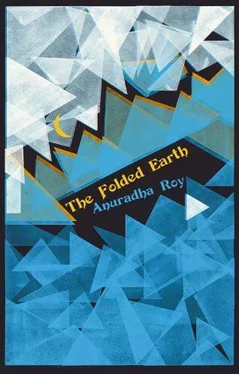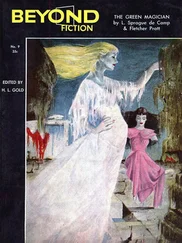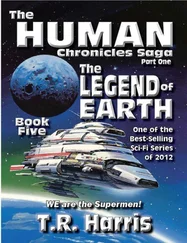In a while, I was exhausted. I sat on the floor, and looked in despair at the tumbling heaps of books around me. I would never get them back on their shelves now.
I began to look through the ones close enough to reach without getting up: a murder mystery, a book on hill plants, Sàlim Ali’s Indian Hill Birds . And then, between the pages of a fat collection of short stories, the old copy of T. S. Eliot’s millimetre-thin Practical Cats that Michael had given me long ago. His angular handwriting rode a diagonal across one of the blank pages, “To my own perverse, pigheaded Rum Tum Tugger”.
I pulled a cushion to me and lay on the rug, tenting my face in the opened pages of the book, breathing in its antique smell.
I would not look into the future. My life had been too cruelly overturned once before for me to think of anything but the present moment. I would negotiate each day as if I were riding a leaf in a flowing stream: enough to stay afloat. I would not ask for more.
The monsoon in our hills is a time of thunder, lightning, water, and wind so endless that it has been known to push people into fits of rage. One day, not a month into the monsoon, the taekwondo teacher at one of the other schools punched two boys senseless because he suspected them of stealing his camera. He had come upon them peddling a similar camera in Babita Studio. He wrecked the shop too, shattering framed photographs of just-married couples with a hammer he had bought from the shop next door. The combined strength of three taxidrivers and a policeman was needed for him to be handcuffed and taken to the police station. By then the boys were bleeding, while Babita Studio was in shards — and who was going to pay for the damage? Better to occupy yourself with gossip than break each other’s bones: and that is how most people spent the time, watching the rain, drinking tea, and gossiping.
When the clouds came lower and lower, to rest on our hills, they wiped away the mountains on the other side of the valley and bleached the distant trees of colour, turning them into charcoaled lines on the grey-white sky. Houses felt furry with fungus and damp. Dripping umbrellas spoked pools of water before every front door. The hills were a lush, brilliant green, and wild gladioli drooped everywhere in the rain. The forest was carpeted with pretty, mauve, orchid-like flowers. Roads were reclaimed by nature as landslides buried them and waterfalls drowned them, the wind felled trees, electricity failed, and telephones died, cutting off our town. Some days, the clouds gave way to lurid sunsets, and then the curtains closed again.
That August, I wanted nothing more than for our rain-soaked town to remain untouched, cocooned and cut off from the boiling world below. Instead, the newspaper came in two-day-old bunches, the pages stuck together with damp; when I peeled them apart, they were filled with news from Orissa, every day something more brutal: churches burned, missionaries hounded, Christians driven out of their villages into refugee camps, a young woman raped, thrown into a fire and burned alive.
I could not tell if Miss Wilson deliberately left the paper open to the page with news from Orissa. It stared at me when I sat opposite her for our daily staff meetings. The paper would be turned in my direction so I did not need to read upside-down. She began to say, “We Christians are used to sacrifices for the glory of Our Lord. We have made them since St Thomas landed in Kerala soon after Our Lord’s Ascension. Who runs all of India’s good schools? Who cares for the poor?” She pronounced it as “pore” and then after a perfunctory pause, “We, Christians.”
Miss Wilson had a brother in Orissa who worked for a T.V. channel called DivineLite, which aimed to make Christianity more accessible through stories of everyday triumphs over greed, lust, envy, and such-like. Recent converts who looked jubilant — and prosperous — explained how Jesus had transformed their lives and urged others to find the same sustenance and joy. Every programme began and ended with a feature called “Prayer of the Day” during which the entire cast of DivineLite held hands, shut their eyes, and intoned a recently written prayer. For several days now, the prayer had been, “Let us put down the weapon of hatred and violence and put on the armour of love. Let us forgive one another and ask forgiveness from one another for the wrong we have done to each other and reach out in love to each other.”
One day, the T.V. channel’s office was picketed by a bunch of hoodlums shouting slogans calling for it to be shut down. Miss Wilson told us of the incident the next day. She had tried to reach her brother on the telephone, but he was too choked with fear to talk, she said. They had even been threatened with death. She looked preoccupied and worried and whispered urgently into her mobile now and then. She did not come to the classes to rap tables with her cane and shout “ Quay-it ”. Nor did she realise that the school bells were often being rung late because the chowkidar was more stoned than usual these days. Whenever I came to speak to her in her room, she shuffled papers or fiddled with something on her desk so that she would not have to look at me.
As things got worse in Orissa, the something invisible and dangerous which Miss Wilson and I had tip-toed around all this time grew in size until it took up most of the space. Despite my marriage and the change in my surname, I had never converted to Christianity. Michael’s parents had said they would accept me if I converted, but Michael did not want me to, and neither did his priest. Only if it comes naturally, Father Joseph had said, only when the time is right. In the weeks after Michael’s death he had asked me a few times if I would meet Michael’s parents: this great grief could be a time for healing and forgiveness, he said. But I thought they might blame me more ferociously now for the years of Michael that they had lost. The time for friendship is over, I had told the Father. The next week Father Joseph had relayed another request from them: they wanted something from Michael’s rucksack as a memento of their son’s last journey, a crumb from his final days. At that time, I was distraught enough to have handed them the entire rucksack, and all his other belongings, to stop them bothering me. But then too, Father Joseph had stopped me. “There is no hurry,” he had said. “Give them something later when you are able to look through his belongings. When it comes naturally. One day you’ll be ready, not now.”
Miss Wilson had none of Father Joseph’s wisdom. From the start she had made it clear that whereas I had a job, there were needy Christian teachers still unemployed. I was the undeserving beneficiary of Father Joseph’s influence in the church and she had no option but to put up with me. Now the world beyond was making matters between us too delicate and brittle to survive much stress. And as if there was a conspiracy, this was precisely the time when the election campaign in Ranikhet charged up enough for the political parties to look around for trouble-filled pots they could stir.
* * *
By the middle of August, the bazaar looked as if Diwali had come early. The narrow main street had acquired a glittering, latticed ceiling made of orange, green, silver and gold tinsel. Party symbols hung from it. Every day the bunting grew more ragged in the rain and wind, and the posters on the walls peeled with the damp so that the candidates’ faces grew more and more lopsided.
This was a national election, especially significant for our town because it was the first time a local, Veer’s new friend, the son of the wool merchant, had decided to stand as a candidate. If he won, Ranikhet would no longer be a backwater; it would be pitchforked straight into the centre of Uttarakhand politics; it would get grants and attention, public money would flow in. The wool merchant’s son was called Ankit Rawat. He had adopted a ball of red wool as his logo and his motto was: “ Santusth, Surakshit, aur Garam/Ankit Rawat ka hai Dharam .” Warm, Safe, Free of Need/This is Ankit Rawat’s Creed.
Читать дальше












